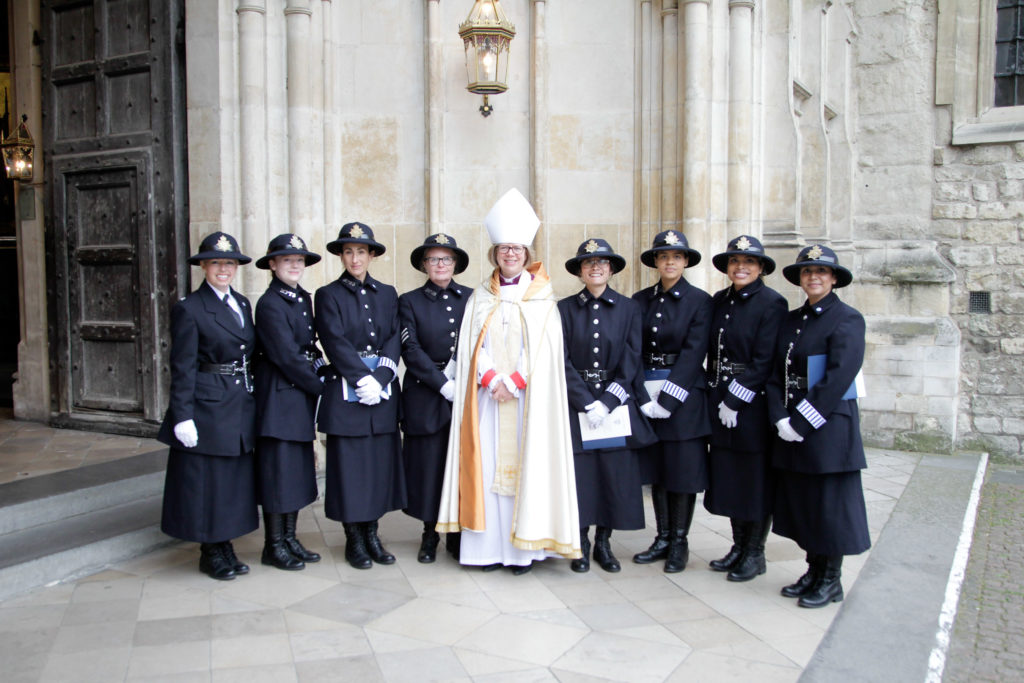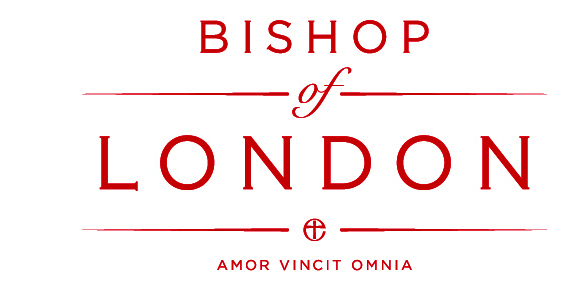
Bishop of London addresses service at Westminster Abbey to mark 100 years of women in the Metropolitan Police
The Bishop of London, the Rt Revd and Rt Hon Dame Sarah Mullally DBE, has delivered an address at a special service of thanksgiving at Westminster Abbey to mark 100 years of women in the Metropolitan Police.
Thousands of police officers, their families and friends gathered to celebrate the occasion and to pay tribute to female police officers past and present. The event mirrored a similar service held at the Abbey 100 years ago which saw the first ever public appearance of female Met officers in uniform, to honour the fallen police officers of the First World War.
The service saw the Metropolitan Police Service colours presented to the Dean of Westminster and placed on the Abbey’s High Altar. Songs from The Met choir and Westminster Abbey’s permanent choir were accompanied by testimonies and readings by serving women officers of varying ranks and departments.
Twelve of the Met’s serving female officers were also in attendance to celebrate their pioneer predecessors by wearing replica 1919 uniforms.
The service marks the culmination of the Met’s #100yearsstrong campaign, which celebrated the centenary by highlighting historic milestones along the journey of women in the Met from a temporary “experiment” to their present day representation at all ranks and departments of the organisation.
The Bishop of London, The Rt Hon and Rt Revd Dame Sarah Mullally DBE, said:
“It is a real privilege to mark 100 years of women in the Metropolitan Police at Westminster Abbey. The journey from an all-male police force to one where women officers are represented in all ranks and areas of police work parallels the wider story of women gradually moving into the public sphere.
“This landmark moment is another reminder of how far women have come in such a short space of time. Just over 100 years ago, the mainstream view was that women could never become police officers. Now, Cressida Dick, the Metropolitan Police Commissioner, has the most senior job in British policing, demonstrating that there is truly no limit in being a woman in the police. In addition, there are nearly 8,000 women officers currently working in the Met, occupying a huge range of vital roles right across the organisation. It is an honour to celebrate their work today and remember the sacrifices and efforts of those who came before them.”
Read Bishop Sarah’s full address below:
100 Years of Women in the Metropolitan Police
Address by the Rt Rev and Rt Hon Dame Sarah Mullally DBE, Bishop of London
Westminster Abbey, 17 May 2019
To live in the service of others is not a popular option in our society today. For me, to serve others is one of the greatest things in life, it is precious and almost as rare – but like all precious things it is costly. Service requires not so much physical strength as strength of character.
The journey from an all-male police force, to one where women officers are fully represented across all ranks and areas of police work, parallels the wider story of women gradually moving into the public square. As in other professions much of it has been precipitated by highly determined and courageous women – for whom we are very grateful.
Today’s service mirrors a similar occasion at Westminster Abbey in May 1919, when six women patrols appeared in uniform for the first time at the Service of Remembrance to Metropolitan Police Officers killed in the First World War. It is a stark reminder to us of the cost of service.
Before the advent of women police officers, a female visitor was appointed in 1883 by the then Metropolitan Police Force to attend to female convicts on license and women subject to police supervision. Police Matrons were usually wives or relatives of male police officers. Then, 100 years ago, on 22 November 1918, the then Commissioner Sir Cecil Macready officially announced that the Metropolitan Police would have female police officers.
Only two years earlier, a Daily Express reporter asked a Scotland Yard official: “Is there any possibility of women being employed as Police Constables?” The reply was “No, not even if the war lasts 50 years.”
However, they were proven wrong in February 1919 when the first female officers took to the streets of London, some 90 years after the Metropolitan Police was founded by Sir Robert Peel in 1829.
There were just 21 of these pioneering women in February 1919, but they quickly grew. Their pay was low and no pension rights were given. Their contracts were to be on a yearly ‘experimental’ basis and they were not to be called police women, they were to be called Women Patrols. They were not sworn in, nor were they given the power of arrest. It was described then as an experiment, and the women had to buy their own uniforms at Harrods!
Today, nearly 8,000 women officers occupy a huge range of influential and important roles across the Met in every area of work and at every rank. All operational policing roles are open to women, whether that is running armed operations, supervising surveillance teams, carrying firearms or supporting victims of crime and abuse.
In the course of a century I know that you must have battled sexism and harassment to lead, rather than to follow, and today it is wonderful that Cressida Dick, the Metropolitan Police Commissioner, has the most senior job in British policing, showing that there is truly no limit to being a woman in the Metropolitan Police.
We should celebrate how progressive the Met has become. In 1918 only some women over 30 could vote; they could not practice law until a year later; Cambridge University didn’t allow women to fully graduate until some 29 years after that ; and, in the Church of England, women could not be priests until 75 years later, or bishops until 2014.
Women playing their full part is not just about equal opportunities – it is good for the Metropolitan Police Force and for the wider community.
In the bible, the image of the body is used for the community of the church, but it does well for the wider community. The body is made up of many parts, all are interdependent but not the same – each part has a different role to play. Without one part of the body, the whole suffers.
The image reminds us that each part of the body needs to be motivated by charitable love, seeking the health of the body rather than one’s own glory – there is no more excellent way.
Your role does not only contribute to the health of the Met but also the health of the community.
Our gospel reading today comes from the final discourse of Jesus’ life, where he talks about those things which are most important. In it Jesus speaks of his desire for us to love each other and to live in the service of one another just as he loves us.
Followers of Jesus Christ believe that every human being is created in the image of God and we are not made in isolation. We belong together in a creation which should be cherished and not simply used and consumed.
We are most human when we know ourselves to be dependent on others. As my colleague the Bishop of Kensington, Dr Graham Tomlin, has said recently, in responding to the tragedy of Grenfell Tower:
“The Christian view of social relations tells us that my neighbour is not so much a threat, or a limitation, but a gift. If my own individuality is constituted by my relationships, not my own inner elusive personality or choices, then without my neighbour I cannot become my full self.”
To love each other comes through seeing the other, not simply as I see them but in the light of God who has created us both. That recognition leaves us not only capable of reaching out in support of others, but also being willing to receive support from others.
Today as we celebrate 100 years of women in the Metropolitan Police, we celebrate a community which understands its dependency on each other – knowing that it is as important to receive support as it is to give it. Know that your strength is in your diversity.
As a former nurse I was delighted to see the first black female police officer was Sislin Fay Allen: a nurse who responded to a recruitment campaign in 1968. I hope that, while we are celebrating 100 years of women in the Metropolitan Police here today, more from Black and Ethnic Minority backgrounds will apply.
Today, we also remember those who have died in the course of their duty, including WPC Jane Arbuthnot and WPC Yvonne Fletcher – a reminder of the ultimate cost of service. Jesus said, “This is my commandment, that you love one another as I have loved you. No one has greater love than this, to lay down one’s life for one’s friends.”
Let us celebrate the policewomen of yesterday and those of today and in doing so I will continue to pray for you.
Amen
